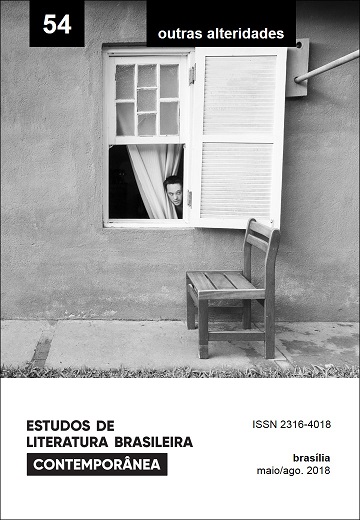Between “ós”, “ais” and “jaguanhenhéns”:
voice and language in Antônio Vieira and Guimarães Rosa from Nuno Ramos
DOI:
https://doi.org/10.1590/10.1590/2316-40185418Abstract
This article takes as its object the articulation of voice and language in Ó (2008), by Nuno Ramos, considering the correlation of this bipartition with the dichotomy culture and nature, as it is stated in Aristotle’s Politics. The essay concludes that Ramos elaborates a descent from language to the voice, a procedure that can be understood as the inversion of the scheme outlined by Padre Antônio Vieira in the sermon “Nossa Senhora do O” (1640), in which the voice is subordinated to language, body to the spirit. We choose the narrative “Meu tio o Iauaretê”, by João Guimarães Rosa, as a possible precursor of the expression "ó" for making possible the crossing of communication lines between human and animal noises, although our conclusion is that Nuno Ramos proposes a one-way street from the spirit to animality, from logos to phoné, which allows us to link his humanist theory of the separation of culture and nature to that proposed by the philosopher Giorgio Agamben; while in Rosa there is be a perspectivist procedure, similar to the one theorized by the anthropologist Eduardo Viveiros de Castro, according to which nature also possesses language, knowledge.
Downloads
References
AGAMBEN, Giorgio (1995). O cinema de Guy Debord. Tradução de Antônio Carlos Santos. Conferência em Genève.
AGAMBEN, Giorgio (2004). The open: man and animal. Translation by Kevin Attell. Stanford: Stanford University Press.
AGAMBEN, Giorgio (1978/2008a). Infância e história: destruição da experiência e origem da história. Tradução de Henrique Burigo. Belo Horizonte: Editora da UFMG.
AGAMBEN, Giorgio (2008b). O fim do poema. Tradução de Sérgio Alcides. Revista Cacto, São Paulo, n. 1.
ARISTÓTELES (2006). A política. Tradução de Roberto Leal Ferreira. 3 ed. São Paulo: Martins Fontes.
CAMPOS, Haroldo de (2010) A linguagem do Iauaretê. In: CAMPOS, Haroldo de. Metalinguagem e outras metas: ensaios de teoria e crítica literária. São Paulo: Perspectiva.
CASTRO, Eduardo Viveiros de (2002). A inconstância da alma selvagem: e outros ensaios de antropologia. São Paulo: Cosac Naify.
DESCARTES, René (2011). Discurso do método. Tradução de Maria Ermantina de Almeida Prado Galvão. São Paulo: Martins Fontes.
FOUCAULT, Michel (2007). As palavras e as coisas. Tradução de Salma Tannus Muchail. 9. ed. São Paulo: Martins Fontes.
HANSEN, João Adolfo (2003). Esquemas para Vieira. In: ROCHA, João Cezar de Castro (Org.). Nenhum Brasil existe. Pequena enciclopédia. Rio de Janeiro: UniverCidade.
NOGUEIRA, Erich Soares (2013). A voz indígena em “Meu tio o iauaretê”, de Guimarães Rosa. Nau Literária, Porto Alegre, v. 9, n. 1, jan./jun. Disponível em: <https://goo.gl/H7snSH>. Acesso em: 14 nov. 2016.
RAMOS, Nuno (2008). Ó. São Paulo: Iluminuras.
ROSA, João Guimarães (2001). Meu tio o Iauaretê. In: ROSA, João Guimarães. Estas histórias. 5. ed. Rio de Janeiro: Nova Fronteira.
SARAIVA, Antônio J. (1980). O discurso engenhoso. Estudos sobre Vieira e outros autores barrocos. São Paulo: Perspectiva.
VIEIRA, Padre Antônio (2016). Nossa senhora do Ó. On-line. Disponível em: <http://www.dominiopublico.gov.br/download/texto/fs000020pdf.pdf>. Acesso em: 14 nov. 2016.
Published
How to Cite
Issue
Section
License
Authors who publish in this journal agree to the following terms:
a) The authors maintain the copyright and grant the journal the right of first publication, the work being simultaneously licensed under the Creative Commons Attribution License-Non Commercial 4.0 which allows the sharing of the work with acknowledgment of the authorship of the work and publication this journal.
b) Authors are authorized to enter into additional contracts separately, for non-exclusive distribution of the version of the work published in this journal (eg publish in institutional repository or as a book chapter), with authorship recognition and publication in this journal.
c) Authors are allowed and encouraged to publish and distribute their work online (eg in institutional repositories or on their personal page) after the editorial process, as this can generate productive changes, as well as increase the impact and citation of published work (See The Effect of Free Access).
d) The authors of the approved works authorize the magazine to, after publication, transfer its content for reproduction in content crawlers, virtual libraries and the like.
e) The authors assume that the texts submitted to the publication are of their original creation, being fully responsible for their content in the event of possible opposition by third parties.


